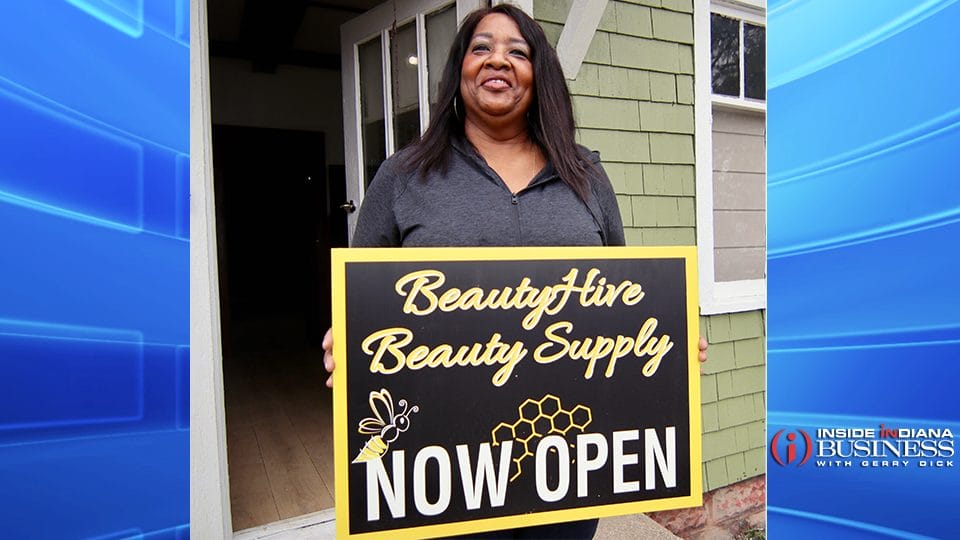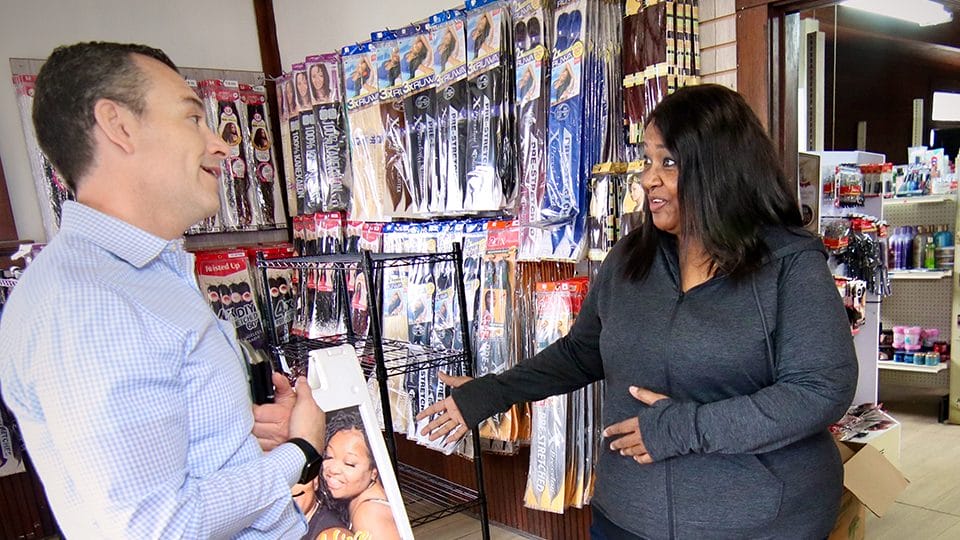CDFI Friendly South Bend connecting small businesses and lenders
Subscriber Benefit
As a subscriber you can listen to articles at work, in the car, or while you work out. Subscribe Now
A not-for-profit in South Bend has made it its mission to make capital accessible to minority-owned small businesses in the area.
Without a community development financial institution within an hour’s drive from the city, CDFI Friendly connects business owners to CDFI capital, according to its website.
“We are looking to try to get more CDFI lenders interested in working in our market,” Sam Centellas, executive director of CDFI Friendly South Bend, said. “The underlying part is working with minority- and women-owned small businesses to help connect them to lending generally through CDFIs, but we’ve expanded that to also work with traditional banks, city municipal funds, and credit unions.”
The organization also connects community development projects like affordable housing, not-for-profits, and other community-facing types of businesses with financing.
With a focus on public purposes, CDFIs use flexible, affordable financing to produce inclusive, equitable, and sustainable results. Since they are profitable but not profit-maximizing, these institutions look at other ways to try to underscore credit criteria and underwriting for a loan.
Using the analogy of knobs on a soundboard, Centellas explained that the sliders need to be in very specific spots for traditional banks because of regulatory specifications, while CDFIs can say although a business scored low on one point, because they scored extremely high on another criteria, they could go ahead and approve the loan. Credit score, equity, debt to income ratio and current debt capacity are some of the factors CDFIs consider.
There’s no one reason why borrowers get denied, but Centellas said in his experience, having a low credit score is rarely the main reason.
“If you don’t own your own home, or a large retirement account, or a rich uncle that can put up collateral for you, no matter how good your business idea is, most financial institutions are going to tell you no,” he said. “You could be the next Jeff Bezos and they’re like, ‘Sorry, you don’t own your own home and we’re not going to finance this.’”
For CDFIs, showing you can pay them back is more important than a collateral pledge. This is also the biggest challenge for business owners, who in most cases have not gone to business school and lack the technical know-how on financial modeling and projection. CDFI Friendly South Bend helps businesses with this aspect for successful loan applications. Still, some businesses have to change their entire strategy after projection results determine they will not be able to pay back in time, Centellas said.
Capital Coaching, one of the organization’s programs funded by a grant from the Indiana Economic Development Corp., enables the organization assist entrepreneurs with a business plan, organize finances and the right legal structure, and put together a strong loan application. They also coach owners on how to position their business in the best light possible to access the type of financing they need.
In its 2023 annual report, CDFI Friendly South Bend said it attracted a total of $3.6 million of CDFI investments to South Bend from 2022. The same amount was raised in the city in the previous 15 years before the not-for-profit was established. The organization’s board projects raising the same amount for 2024.
The organization is set to cut the ribbon for one of its small business owners next week. BeautyHive Beauty Supply is a Black-owned business catering to the hair and beauty needs of South Bend residents. Centellas has worked with founder Willie Dearing since she made the move to apply for a loan for her first storefront downtown.
“She ultimately paid that loan off and then wanted to buy a space and ended up getting a loan from the City of South Bend through the revolving loan fund,” Centellas said. “She’s gone from a home-based hobby business to owning her own building where she’s gonna operate her business out of.”
Dearing started her business out of her home in 2020 after seeing that beauty products for women like her were not readily available in the community. It cost her $6000 of her personal savings and before the end of the year she went to CFSB for help with accessing more capital, upon a friend’s recommendation.
“I love people, I love my community, I love my city, this business is for you,” Dearing said. “This business means to me a new beginning. It just means something different that I never had before but always wanted.”

The Jump Off, a pedal trolley business, is another success story for the not-for-profit. It’s the first trolley of its kind in the South Bend area. A pair of entrepreneurs had gone to some traditional finance institutions, and were refused before approaching CDFI Friendly South Bend. The business launched in May 2023 to great success, Centellas noted.
“In my opinion, they had done all the right things. When we met with them, we thought of some potential options of lending for them and we were ultimately able to get them the loan they needed to buy the trolley,” Centellas said. “They’re a great example of a business who came to us that was not able to access finance and we were able to get them financed.”
Outside capital constraints, small minority-owned businesses also need help with writing a business plan, registering their businesses and scaling in a way that makes sense for them as an individual, their business, family and income, Centellas said.
“As an organization we’re not always able to help every business from a capacity standpoint, and so we need more support in the community to do that,” he added.
The IEDC offers some programs for small business owners, but Centellas said awareness and accessibility challenges make it hard for business owners to actually benefit from the programs.
“For example, a program could be running on Saturdays, but some people may be busy on weekends,” he noted. “Another program could have office hours during the weekday, but the people who need these services are only available at night.”
IEDC recently launched ConnectIND to raise awareness for the different small business programs the state offers and match entrepreneurs with relevant resources for different stages of the entrepreneurial journey. Centellas also called for more collaboration and consistency in designing programs for business owners.
While small businesses are able to access about $25,000 with a two- or three-year term, real estate developers who get $150,000 with a 30-year term get a lower monthly payment than the entrepreneur. So far CDFI Friendly South Bend has had zero defaults, Centellas noted.
With a focus on equipping minority owners, the organization partners with St. Mary’s College’s small business incubator and continue to deliberately invest in other similar communities.
“We’re not discriminatory, we will help anybody that calls, but we are intentionally fishing for the types of businesses and individuals that we think have been overlooked, and probably need our help the most,” Centellas said. “Our statistics are skewed to more of a minority demographic than normal, but when you think of small business, it’s skewed extremely the other way. So all we’re doing is helping right it just a little bit.”
Entrepreneurs also access CDFI Friendly South Bend’s service through referrals from traditional institutions who cannot give the business a loan.
“It’s a little bit of matchmaking,” Centellas added. “For example, we had a great referral from Everwise Credit Union for a business client of theirs that they weren’t able to help, and we referred them to a CDFI partner that was able to do the loan for them.”
Anne Feferman, vice president of business services at Everwise, agreed that more needs to be done for small businesses and entrepreneurs in South Bend.
“We have some amazing programs from Notre Dame and the South Bend-Elkhart Regional Partnership for entrepreneurs,” Feferman said. “Sam with CDFI Friendly South Bend has been involved in all of this, so he’s actually able to move the needle and to get the resources people need.”
As an intermediary in the capital access process, Centellas lauds the partnership ecosystem CFSB has cultivated.
“I’ve become an expert on all the different small business lending programs from banks, credit unions, CDFIs and I can meet with a small business and based on the type of business, refer them to a financial institution specializing in that type of lending,” he explained.
The not-for-profit also organizes ribbon cutting ceremonies for its brick-and-mortar businesses and is playing a crucial role in getting city officials to attend these events.
“Small businesses in general don’t get the treatment of big businesses. When someone opens a new hotel in town or builds a new complex or opens a new car dealership, the mayor and all the people come out and do a ribbon cutting and celebrate it,” Centellas said. “When a small, local, minority business is getting ready to open, oftentimes there’s no one aside from their family, and so we are trying to change that paradigm a little bit to say that every business that’s opening doors in the city deserves to have the mayor come down and help cut the ribbon on their new location.”
Opening in 2020, at the height of the pandemic, CDFI Friendly South Bend got to navigate the unfamiliar terrain along with the entrepreneurs. For both the organization and the businesses they help, Centellas said there’s a lot of buzzing potential. The not-for-profit is also working to expand its services to Elkhart County.
“The business model we’re following is working. ‘23 was a good year and we think ‘24 is gonna be not only double better, I think triple better,” Centellas projected. “So we’re building more momentum. Hopefully, this is just one step in a momentum machine.”
